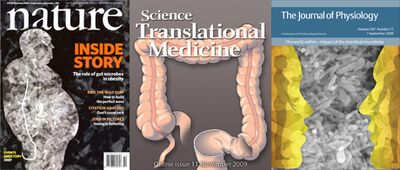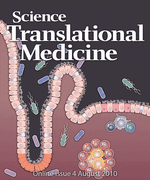Turnbaugh: Difference between revisions
No edit summary |
No edit summary |
||
| Line 4: | Line 4: | ||
The human ‘metagenome’ is a composite of <i>Homo sapiens</i> genes and the genomes of the trillions of microbes that colonize our adult bodies (the ‘microbiome’). Our largest collection of microbes resides in the gut, where an estimated 10-100 trillion organisms reside (the gut microbiota). The gut microbiome extends human metabolism by enabling the degradation of otherwise indigestible components of our diet, and by influencing the activity, toxicity, and bioavailability of therapeutics. These microbial biotransformations can have important consequences for host health and disease, including contributing to metabolic syndrome, inflammatory bowel disease, and cancer. | The human ‘metagenome’ is a composite of <i>Homo sapiens</i> genes and the genomes of the trillions of microbes that colonize our adult bodies (the ‘microbiome’). Our largest collection of microbes resides in the gut, where an estimated 10-100 trillion organisms reside (the gut microbiota). The gut microbiome extends human metabolism by enabling the degradation of otherwise indigestible components of our diet, and by influencing the activity, toxicity, and bioavailability of therapeutics. These microbial biotransformations can have important consequences for host health and disease, including contributing to metabolic syndrome, inflammatory bowel disease, and cancer. | ||
[[Image:F1.medium.gif|150px||left|] | [[Image:F1.medium.gif|150px||left|][Image:MauriceCellCover.jpg|150px||left|]] | ||
Despite the recent surge in human gut microbiome research, a number of basic questions regarding the assembly, structure, and functional operations of the gut microbiome remain unanswered. Our research involves the development and application of metagenomic tools for understanding how the gut microbiome influences drug metabolism and nutrition. We are currently pursuing complementary techniques for cell cytometry, microfluidics, and metabolomics, allowing a more comprehensive view of host-microbial interactions and microbial ecology. | Despite the recent surge in human gut microbiome research, a number of basic questions regarding the assembly, structure, and functional operations of the gut microbiome remain unanswered. Our research involves the development and application of metagenomic tools for understanding how the gut microbiome influences drug metabolism and nutrition. We are currently pursuing complementary techniques for cell cytometry, microfluidics, and metabolomics, allowing a more comprehensive view of host-microbial interactions and microbial ecology. | ||
</div> | </div> | ||
<p> | <p> | ||
Revision as of 17:38, 17 January 2013

The human ‘metagenome’ is a composite of Homo sapiens genes and the genomes of the trillions of microbes that colonize our adult bodies (the ‘microbiome’). Our largest collection of microbes resides in the gut, where an estimated 10-100 trillion organisms reside (the gut microbiota). The gut microbiome extends human metabolism by enabling the degradation of otherwise indigestible components of our diet, and by influencing the activity, toxicity, and bioavailability of therapeutics. These microbial biotransformations can have important consequences for host health and disease, including contributing to metabolic syndrome, inflammatory bowel disease, and cancer.

Despite the recent surge in human gut microbiome research, a number of basic questions regarding the assembly, structure, and functional operations of the gut microbiome remain unanswered. Our research involves the development and application of metagenomic tools for understanding how the gut microbiome influences drug metabolism and nutrition. We are currently pursuing complementary techniques for cell cytometry, microfluidics, and metabolomics, allowing a more comprehensive view of host-microbial interactions and microbial ecology.